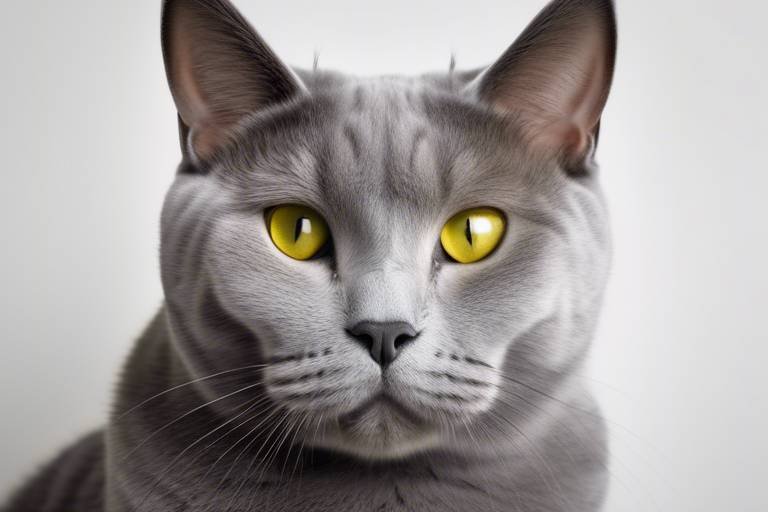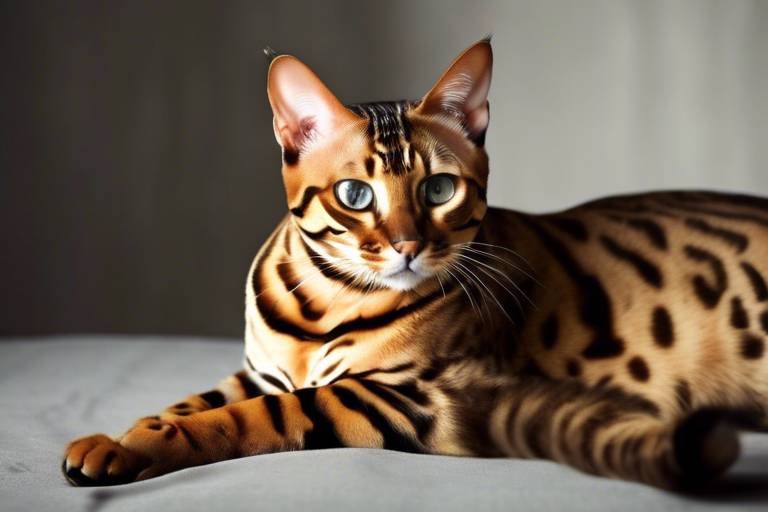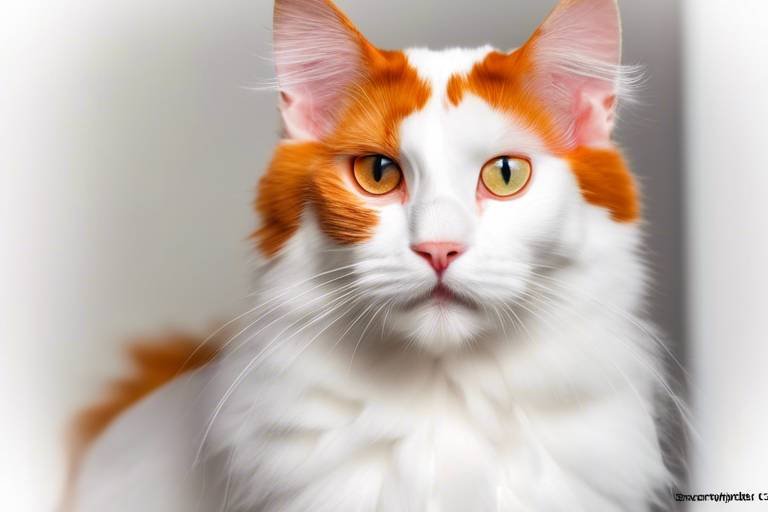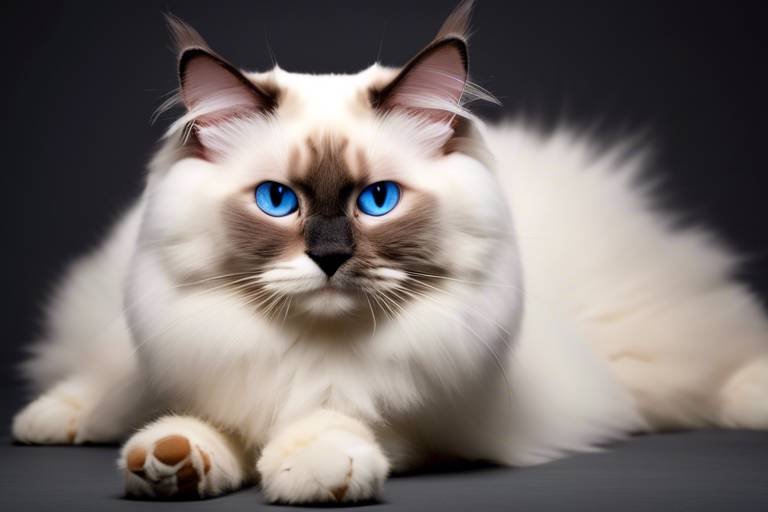The Distinct Features of Siamese Cats
This article explores the unique characteristics of Siamese cats, including their appearance, personality traits, vocalizations, and health considerations, providing a comprehensive understanding of this beloved breed.
Siamese cats are known for their striking looks, featuring a sleek body, large ears, and captivating blue almond-shaped eyes. Their unique color points set them apart from other breeds, giving them a distinctive and elegant appearance. The color points typically manifest as darker shades on their ears, face, paws, and tail, contrasting beautifully with their lighter body color. This striking color contrast not only makes them visually appealing but also adds to their mystique. It's almost as if they are wearing a tailored suit, perfectly designed to catch the eye. Furthermore, their short, fine coat requires minimal grooming, making them an attractive option for those who appreciate beauty without the hassle of extensive maintenance.
These cats are famous for their outgoing and social personalities. Siamese cats are known to be affectionate, vocal, and intelligent, often forming strong bonds with their human companions. Their playful nature can turn any dull moment into a delightful experience. If you’ve ever had a Siamese cat, you’ll know that they are not just pets; they are family members who thrive on interaction and companionship. Imagine coming home after a long day to a little furball that greets you with enthusiastic meows, as if to say, "Where have you been? I’ve missed you!"
Siamese cats are among the most talkative breeds, using their distinctive voices to communicate with their owners. Their vocalizations can range from soft chirps to loud calls, expressing their needs and emotions. It’s as if they have a whole dictionary of sounds at their disposal! Whether they are asking for food, demanding attention, or simply sharing their thoughts, their vocal range is impressive. Some owners even claim that their Siamese cats can hold entire conversations, responding to questions with a series of meows that sound almost like sentences. This unique ability to communicate makes them even more endearing and engaging companions.
Due to their sociable nature, Siamese cats thrive on interaction with humans and other pets. They often require companionship and can become lonely if left alone for extended periods. Think of them as the social butterflies of the feline world; they need their social fix! If you’re considering adopting a Siamese cat, it’s crucial to ensure that they have plenty of stimulation and companionship, whether that’s through playtime with you, interaction with other pets, or even puzzle toys that challenge their minds. A lonely Siamese is a sad Siamese, and no one wants that!
Siamese cats are highly playful and energetic. They enjoy engaging in interactive play and often exhibit kitten-like behavior well into adulthood, making them entertaining companions. Their playful antics can bring joy and laughter into your home, as they leap and bound around with an energy that seems endless. Whether it’s chasing after a feather toy or pouncing on a laser dot, their enthusiasm for play is contagious. It’s not uncommon to find yourself laughing at their silly antics, making every day feel like a new adventure.
Siamese cats are known for their high intelligence, which allows them to learn tricks and commands quickly. Their curiosity often leads them to explore their surroundings and engage in problem-solving activities. They are like little furry Einsteins, always looking for ways to challenge themselves and learn new things. If you enjoy teaching your pets tricks, a Siamese cat will likely be your most enthusiastic student. Their ability to understand and respond to commands makes training a rewarding experience, and you might even find that they can outsmart you on occasion!
Like all breeds, Siamese cats can be prone to specific health issues. Understanding these potential problems can help owners provide better care and ensure a long, healthy life for their pets. Regular veterinary check-ups, a balanced diet, and an active lifestyle are essential components of maintaining their health. Just like humans, cats need regular health assessments to catch any issues early on.
Siamese cats may be susceptible to certain genetic conditions, including respiratory issues and dental problems. Regular veterinary check-ups can help in early detection and management of these concerns. It's important for owners to be aware of the signs of these conditions, such as difficulty breathing or changes in eating habits, and to seek veterinary care promptly. Keeping an eye on their health can help ensure that your Siamese remains a vibrant part of your family.
Proper nutrition is essential for maintaining the health of Siamese cats. A balanced diet tailored to their age and activity level can help prevent obesity and related health issues. Just like we need a good diet to fuel our bodies, Siamese cats require the right nutrients to stay active and healthy. Consider consulting with your veterinarian to determine the best type of food for your furry friend, ensuring they receive the vitamins and minerals necessary for optimal health.
- Are Siamese cats hypoallergenic? While no cat is completely hypoallergenic, Siamese cats are known to produce fewer allergens compared to other breeds.
- Do Siamese cats get along with other pets? Yes, they are typically very social and can get along well with other pets, especially if introduced properly.
- How long do Siamese cats live? On average, Siamese cats can live between 12 to 20 years with proper care.
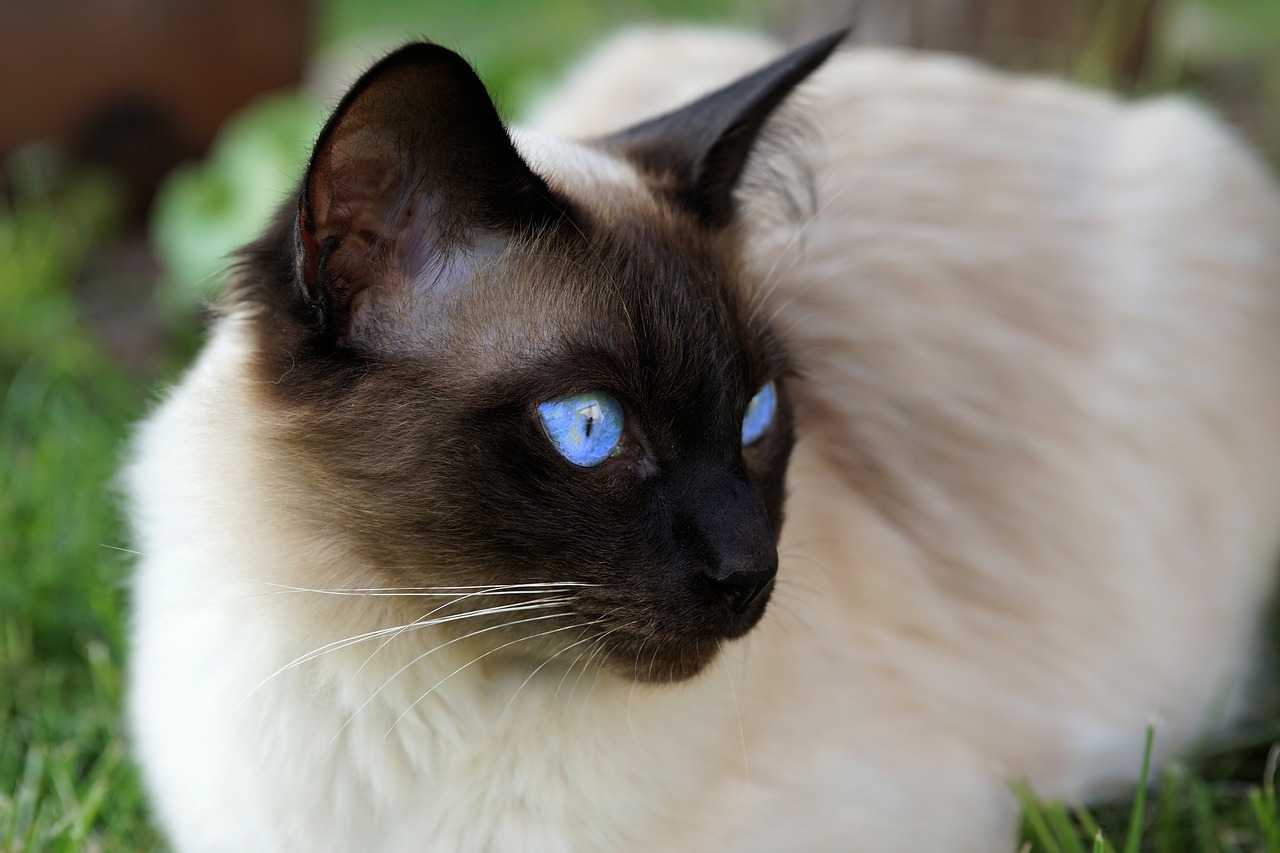
Physical Appearance
Siamese cats are truly a feast for the eyes, showcasing a striking appearance that makes them stand out in any crowd. Their bodies are svelte and muscular, giving them an elegant look that is both graceful and athletic. One of their most remarkable features is their large, pointed ears that seem to perk up at the slightest sound, enhancing their alertness and curiosity. These ears are not just for show; they contribute to their keen sense of hearing, allowing them to be more aware of their surroundings.
Another captivating aspect of Siamese cats is their almond-shaped blue eyes. These eyes are not only beautiful but also expressive, often reflecting their emotions and moods. Whether they are feeling playful, curious, or even a bit mischievous, their eyes seem to tell a story. The contrast between their striking blue irises and their coat color is nothing short of mesmerizing.
Speaking of coat color, Siamese cats are famous for their unique color points. This means that while the majority of their body is a lighter shade, their ears, face, paws, and tail are darker. The classic color points include:
- Seal Point: Dark brown points on a fawn or cream body.
- Chocolate Point: Milk chocolate points on a lighter ivory body.
- Blue Point: Gray-blue points on a silvery-white body.
- Lilac Point: Pale gray points on a white body with a hint of pink.
This stunning contrast not only adds to their charm but also makes them one of the most recognizable breeds in the cat world. Their short, fine coat requires minimal grooming, which is a plus for busy cat owners. However, it's essential to maintain their coat's luster and health with regular brushing.
In addition to their physical traits, Siamese cats possess a distinct posture. They often sit upright, exuding confidence and poise. Their long tails, which are typically slender and flexible, are often held high, signaling their playful and curious nature. Overall, the physical appearance of a Siamese cat is a beautiful blend of elegance, charm, and a touch of the exotic, making them a favorite among cat lovers.
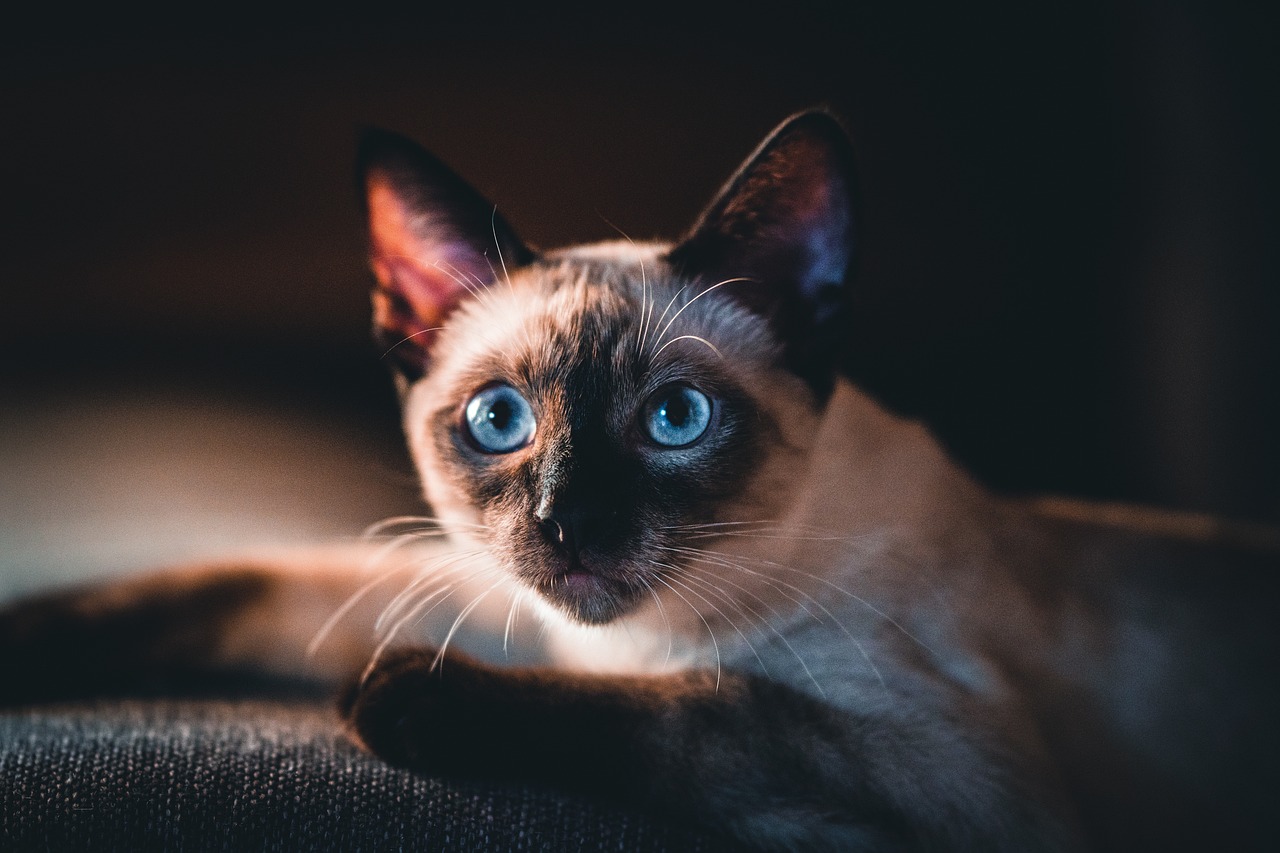
Personality Traits
Siamese cats are truly a breed apart, not just in their stunning appearance but also in their vibrant personalities. These felines are renowned for being exceptionally outgoing and social, traits that make them delightful companions. If you’ve ever wondered what it’s like to have a Siamese cat in your home, imagine a little furry friend who thrives on interaction and attention. They are the life of the party, always eager to engage with their human family members and even other pets. Their affectionate nature means they often seek out cuddles and will happily curl up on your lap while you relax.
What sets Siamese cats apart is their vocalization. They are among the most talkative cat breeds, using a variety of sounds to express their feelings and desires. From soft chirps that might remind you of a gentle breeze to loud, demanding calls that can echo through your home, Siamese cats know how to make their voices heard. This unique way of communicating not only showcases their intelligence but also strengthens the bond they share with their owners. It's almost as if they have their own language, one that invites you into their world of thoughts and emotions.
Speaking of intelligence, Siamese cats are known for their remarkable mental agility. They are quick learners and often enjoy participating in interactive games that challenge their minds. Whether it's fetching a toy or solving a puzzle, these cats thrive on activities that stimulate their curiosity. Their playful nature doesn't fade with age; instead, they maintain a youthful spirit that keeps them engaged and lively. You might find yourself laughing as your Siamese cat chases after a feather toy, showcasing their acrobatic skills and zest for life.
However, it's essential to remember that their sociable nature means they can become lonely if left alone for too long. Siamese cats thrive on companionship, so if you’re considering bringing one into your home, be prepared for a commitment to their emotional needs. They often do well in households with multiple pets, as this can provide them with the social interaction they crave. The more, the merrier, right? Just like us, these cats need friends to share their lives with, and they’ll reward you with endless love and entertainment in return.
In summary, Siamese cats are not just pets; they are lively companions that bring warmth and joy into any home. With their affectionate demeanor, vocal communication, and playful spirit, they truly embody the essence of what it means to be a beloved family member. If you’re looking for a cat that will keep you on your toes and fill your days with laughter and love, a Siamese might just be the perfect fit for you!
- Are Siamese cats good with children? Yes, they are generally very friendly and can get along well with children, making them great family pets.
- Do Siamese cats require a lot of attention? Yes, they thrive on social interaction and may become lonely if left alone for long periods.
- Can Siamese cats be left alone during the day? While they can manage for a few hours, it’s best to have another pet around or provide them with plenty of toys to keep them entertained.
- How vocal are Siamese cats? Extremely vocal! They use a variety of sounds to communicate their needs and feelings.
Vocalizations
Siamese cats are renowned for their expressive vocalizations, which can be quite a surprise for new cat owners. Unlike many other breeds that may communicate through soft meows or purrs, Siamese cats have a unique way of making their voices heard. Their vocalizations can range from soft chirps to loud, demanding calls. It's almost as if they are having a conversation with you, sharing their thoughts and feelings in a way that is both charming and, at times, a little overwhelming!
These vocalizations serve various purposes, including expressing their needs, desires, and emotions. For instance, if your Siamese is feeling playful, you might hear a series of soft, inviting chirps that beckon you to join in on the fun. On the other hand, if they are hungry or seeking attention, their calls can escalate to loud, persistent meows that are hard to ignore. This vocal variety is part of what makes Siamese cats such engaging companions.
Interestingly, Siamese cats have developed a unique communication style with their owners. They often use their voices to establish a bond, and many owners report that their Siamese cats seem to understand them on a deeper level. It's not uncommon for these cats to "talk back" when spoken to, creating a delightful back-and-forth that can brighten any day. This level of interaction is akin to having a chatty roommate who always has something to say!
Here’s a quick breakdown of some common vocalizations you might encounter:
- Chirps: Short, high-pitched sounds often made during playtime.
- Meows: Ranging from soft to loud, these are used to get your attention.
- Yowls: Longer, more drawn-out calls that can indicate frustration or mating behavior.
- Purrs: Typically a sign of contentment, but can also indicate discomfort in some cases.
Overall, the vocalizations of Siamese cats are a delightful aspect of their personality. They not only serve as a means of communication but also enhance the bond between the cat and its owner. If you’re looking for a feline friend who will keep you entertained with their chatter, a Siamese cat might just be the perfect choice for you!
Q: Why do Siamese cats talk so much?
A: Siamese cats are naturally vocal and use their voices to communicate their needs and emotions. Their social nature drives them to engage with their owners through vocalizations.
Q: Are all Siamese cats equally vocal?
A: While Siamese cats are generally known for being vocal, individual personalities can vary. Some may be more talkative than others, depending on their unique traits and environment.
Q: How can I respond to my Siamese cat's vocalizations?
A: Engaging with your Siamese cat by talking back or responding to their calls can strengthen your bond. They love interaction, so feel free to have a "conversation" with them!
Q: Can excessive vocalization indicate a problem?
A: Yes, if your Siamese cat is suddenly more vocal than usual, it could indicate stress, discomfort, or health issues. It's essential to monitor their behavior and consult a veterinarian if needed.
Social Interaction
Siamese cats are not just pets; they are companions in every sense of the word. If you’ve ever met one, you know they thrive on interaction and love being part of the family. These cats are incredibly social creatures, often seeking out human company and even forming deep bonds with their owners. Imagine coming home after a long day, and your Siamese is there, eagerly waiting to greet you with a chirpy meow, as if to say, “I missed you!” This is the essence of their affectionate nature.
What makes Siamese cats particularly unique is their need for companionship. They aren’t the type to be left alone for long periods; doing so can lead to feelings of loneliness and boredom. In fact, they may even express their dissatisfaction through vocalizations or playful antics. To keep your Siamese happy, consider having another pet for them to interact with, or dedicate some quality time each day to play and cuddle. Think of it like a dance; the more you engage with them, the more vibrant and lively their performance becomes.
In addition to their love for human interaction, Siamese cats are also known to be quite social with other pets. They often get along well with dogs and other cats, especially if they are introduced at a young age. It’s fascinating to watch them play and interact, often engaging in playful chases or cuddle sessions. Their playful nature allows them to bond with others, creating a lively household atmosphere. However, it’s essential to monitor these interactions, especially with larger or more dominant pets, to ensure that everyone feels safe and comfortable.
Here are a few tips to enhance your Siamese cat's social interaction:
- Engage in Play: Use interactive toys to stimulate their mind and encourage bonding.
- Spend Quality Time: Dedicate specific times each day for cuddling or playing.
- Introduce New Friends: If considering another pet, introduce them gradually to ensure a smooth transition.
Ultimately, the social interaction that Siamese cats crave is what makes them such a delightful addition to any home. Their charming personalities and affectionate nature create a warm, inviting environment that can brighten anyone's day. So, if you're ready to welcome a Siamese into your life, be prepared for a relationship filled with love, laughter, and plenty of social engagement!
- Do Siamese cats get along with other pets?
Yes, Siamese cats are typically very social and can get along well with other pets, especially if introduced properly. - How much attention do Siamese cats need?
They require a lot of attention and can become lonely if left alone for long periods. - Are Siamese cats vocal?
Yes, they are known for their distinctive vocalizations and often “talk” to their owners. - What is the best way to play with a Siamese cat?
Interactive toys, feather wands, and laser pointers are great ways to engage them in play.
Playfulness
Siamese cats are not just your average feline companions; they are bundles of energy and joy, often exhibiting a playful demeanor that can brighten anyone's day. Imagine having a little acrobat in your home, darting around corners, and leaping onto shelves with the grace of a gymnast. Their playful nature is one of the many reasons why they are cherished by cat lovers worldwide. Unlike many other breeds that may mellow out as they age, Siamese cats retain their kitten-like enthusiasm well into adulthood. This means that your Siamese will likely be ready for a game of chase or a session of interactive play even when they are several years old.
What do they enjoy, you ask? Well, Siamese cats thrive on activities that stimulate both their minds and bodies. They are particularly fond of toys that mimic the movements of prey, such as feather wands or laser pointers. These toys not only provide physical exercise but also cater to their innate hunting instincts. You might find yourself laughing as your Siamese pounces with fierce determination, only to stop and look at you, as if to say, "Did you see that?"
Moreover, these cats are known for their social playfulness. They love engaging with their human companions and often initiate playtime by bringing their toys to you or playfully nudging your hand. This behavior is not just about fun; it's their way of forming bonds and expressing affection. In fact, Siamese cats can become quite attached to their owners, often following them around the house, ready for the next adventure. If you’re looking for a cat that will keep you entertained and engaged, a Siamese might just be your perfect match.
It's important to remember that their playful nature requires attention and interaction. If left alone for long periods, they can become bored and may resort to mischief. To keep your Siamese mentally stimulated, consider setting aside time each day for interactive play. Whether it's a game of fetch, a puzzle toy, or a simple game of hide and seek, your Siamese will appreciate the effort and will reward you with endless entertainment and affection.
- How much playtime do Siamese cats need? Siamese cats are very active and typically require at least 30 minutes of playtime each day to keep them happy and healthy.
- What are the best toys for Siamese cats? Toys that mimic prey, such as feather wands, balls, and laser pointers, are ideal for engaging their hunting instincts.
- Can Siamese cats play alone? While they can entertain themselves, Siamese cats thrive on interaction and companionship, so regular playtime with their owners is essential.
- Do Siamese cats enjoy water play? Surprisingly, many Siamese cats are fascinated by water and may enjoy playing with running water or even joining you in the bathtub!
Intelligence
Siamese cats are not just pretty faces; they are also some of the most intelligent felines you'll ever encounter. Their keen minds and curious nature make them adept at learning new tricks and commands, often surprising their owners with their quick grasp of concepts. Imagine having a cat that can fetch a toy or even respond to its name—this is the reality for many Siamese cat owners! Their intelligence is not just limited to learning tricks; it also manifests in their ability to solve problems and navigate their environments with ease.
One of the fascinating aspects of Siamese intelligence is their innate curiosity. These cats love to explore their surroundings, and they often find themselves in amusing predicaments as they investigate every nook and cranny of their home. This trait can lead to some entertaining moments, as they are always on the lookout for new adventures. It’s almost as if they have an insatiable thirst for knowledge, driving them to understand the world around them.
Moreover, Siamese cats are known for their social intelligence. They form strong bonds with their human companions and can read emotions quite well. This ability allows them to respond appropriately to their owners' moods, providing comfort and companionship when needed. It's not uncommon for a Siamese cat to curl up next to you when you're feeling down or to engage in playful antics when you're happy. Their emotional awareness is a testament to their intelligence and adds a unique dimension to their personality.
To give you a better understanding of the intelligence level of Siamese cats, here’s a quick comparison table with other popular cat breeds:
| Cat Breed | Intelligence Level | Trainability |
|---|---|---|
| Siamese | High | Very Easy |
| Persian | Moderate | Easy |
| Bengal | High | Moderate |
| Maine Coon | Moderate | Easy |
As you can see from the table, Siamese cats stand out with their high intelligence and trainability. This makes them not just good pets but also excellent companions who can engage in interactive play and mental challenges. They thrive when given tasks to complete, whether it's a puzzle toy or a simple game of hide and seek. Keeping their minds stimulated is crucial for their overall happiness and well-being.
In conclusion, the intelligence of Siamese cats is one of the many reasons they are cherished by cat lovers worldwide. Their ability to learn, adapt, and connect with their human companions adds a layer of depth to their personality that is truly remarkable. So, if you're considering bringing a Siamese cat into your life, be prepared for a delightful mix of playfulness, curiosity, and loving companionship that will keep you entertained and engaged for years to come.
- Are Siamese cats easy to train? Yes, their high intelligence makes them very trainable, and they often enjoy learning new tricks.
- Do Siamese cats require a lot of mental stimulation? Absolutely! They thrive on interactive play and mental challenges to keep them happy and healthy.
- How can I keep my Siamese cat entertained? Consider puzzle toys, interactive games, and regular playtime to keep their minds engaged.
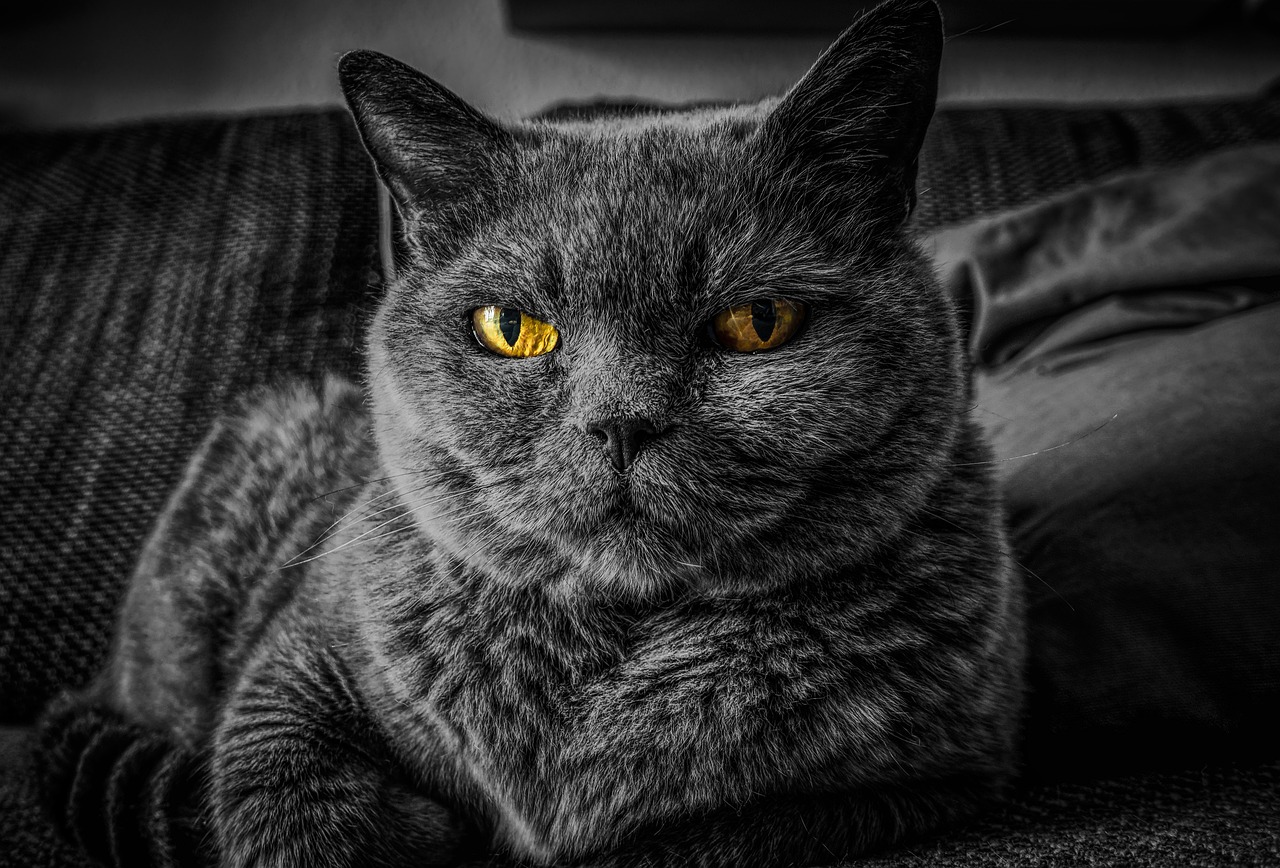
Health Considerations
When it comes to caring for your beloved Siamese cat, understanding their unique health considerations is crucial. Just like humans, these beautiful felines can experience a variety of health issues, some of which may be more prevalent in their breed. Regular check-ups with your veterinarian are essential for early detection and management of any potential problems. By being proactive, you can help ensure that your Siamese cat enjoys a long and vibrant life.
One of the most common health concerns for Siamese cats is their susceptibility to certain genetic conditions. For instance, they are known to face respiratory issues due to their unique facial structure. This can lead to problems like asthma or bronchitis, which may require regular monitoring and treatment. Additionally, dental problems are also a concern; Siamese cats can develop periodontal disease if their dental hygiene is not maintained. Regular teeth brushing and vet check-ups can help mitigate these risks.
Another important aspect of your Siamese cat's health is their diet and nutrition. Providing a balanced diet tailored to their specific needs is essential. Siamese cats are known for their energetic nature, so ensuring they receive the right nutrients can help maintain their health and prevent obesity. Here’s a quick overview of what to keep in mind when it comes to feeding your Siamese:
| Age Group | Recommended Diet | Notes |
|---|---|---|
| Kittens | High-protein kitten food | Supports growth and energy needs |
| Adults | Balanced adult cat food | Maintains healthy weight and energy levels |
| Senior Cats | Low-calorie, high-fiber food | Helps prevent obesity and supports joint health |
As a responsible pet owner, it's important to monitor your Siamese cat's weight and activity levels. If you notice any sudden changes, such as weight loss or lethargy, it’s advisable to consult with your veterinarian. These could be signs of underlying health issues that need prompt attention.
Lastly, mental stimulation is just as important as physical health. Siamese cats are incredibly intelligent and require regular engagement to prevent boredom. Interactive toys, puzzle feeders, and playtime can help keep their minds sharp and their spirits high. By investing time in their physical and mental well-being, you’ll ensure that your Siamese cat remains a happy and healthy companion for years to come.
- What are the common health issues in Siamese cats?
Siamese cats may face respiratory issues, dental problems, and obesity if not properly cared for. Regular vet visits are crucial. - How can I maintain my Siamese cat's dental health?
Regular teeth brushing, dental treats, and professional cleanings can help prevent periodontal disease. - What should I feed my Siamese cat?
A balanced diet appropriate for their age and activity level is essential. Consult your vet for specific recommendations. - How often should I take my Siamese cat to the vet?
Regular check-ups at least once a year are recommended, but more frequent visits may be necessary for older cats or those with health issues.
Common Health Issues
Siamese cats, while generally healthy and vibrant, can be predisposed to certain genetic health issues that every owner should be aware of. One of the most common concerns is related to their respiratory system. Due to their unique facial structure, Siamese cats may experience breathing difficulties, especially in hot or humid conditions. This characteristic, known as brachycephaly, can lead to a range of complications, making it essential for owners to monitor their pet's breathing patterns closely.
Another health issue that Siamese cats often face is dental problems. These cats are more susceptible to periodontal disease, which can lead to tooth loss and other serious health complications if not addressed. Regular dental check-ups and at-home dental care, such as brushing their teeth or providing dental treats, can go a long way in maintaining their oral health.
Additionally, Siamese cats are known to be at risk for certain genetic disorders that can affect their overall well-being. For instance, they may be more prone to conditions like amyloidosis, a disorder where protein builds up in organs, particularly the liver. It’s crucial for owners to be aware of the signs and symptoms associated with these conditions, as early detection can significantly improve the prognosis.
To help you understand the common health issues associated with Siamese cats, here’s a quick overview:
| Health Issue | Description |
|---|---|
| Respiratory Issues | Breathing difficulties due to their facial structure. |
| Dental Problems | Increased risk of periodontal disease and tooth loss. |
| Amyloidosis | Protein build-up in organs, especially the liver. |
Regular veterinary visits are vital for early detection and management of these health concerns. Owners should keep an eye on their Siamese cat’s behavior and physical condition, as changes can often indicate underlying health issues. By being proactive and attentive, you can help ensure that your Siamese cat leads a long, happy, and healthy life.
- What are the signs of respiratory issues in Siamese cats? Look for labored breathing, wheezing, or excessive panting.
- How can I maintain my Siamese cat's dental health? Regular dental check-ups, brushing their teeth, and providing dental treats can help.
- Are Siamese cats more prone to specific diseases? Yes, they can be predisposed to conditions like amyloidosis and respiratory problems.
Diet and Nutrition
When it comes to the health and well-being of your Siamese cat, proper nutrition is absolutely crucial. These vibrant felines have specific dietary needs that cater to their unique physiology and active lifestyle. A balanced diet not only supports their energy levels but also plays a significant role in preventing health issues that can arise from poor nutrition. So, what should you consider when feeding your Siamese?
First off, it's essential to choose a high-quality cat food that is rich in protein. Siamese cats are naturally energetic and require more protein than some other breeds to maintain their muscle mass and overall health. Look for foods that list a high-quality source of protein, such as chicken or fish, as the first ingredient. Additionally, consider incorporating wet food into their diet. Not only does it provide hydration, which is vital for their urinary tract health, but it can also be more palatable for these discerning eaters.
Moreover, Siamese cats can be prone to obesity, especially if they are not as active as they should be. To combat this, you might want to measure their food portions according to their age, weight, and activity level. A good rule of thumb is to consult with your veterinarian for tailored recommendations. They can help you determine the right caloric intake and the best type of food that suits your cat's individual needs.
It's also worth noting that Siamese cats are known for their curiosity and intelligence, which can lead them to explore their food options. While it's tempting to treat them with human food, be cautious. Some foods that are safe for humans can be harmful to cats. Always stick to treats designed specifically for felines and avoid sharing your meals. If you're ever in doubt about what to feed your Siamese, a quick chat with your vet can clear things up.
To summarize, here are some key points to keep in mind regarding your Siamese cat's diet:
- Opt for high-quality protein-rich cat food.
- Incorporate wet food for hydration and taste.
- Monitor food portions to prevent obesity.
- Avoid giving human food unless approved by a vet.
By focusing on these dietary guidelines, you can help ensure your Siamese cat remains healthy, happy, and full of energy. Remember, a well-fed cat is a happy cat, and your Siamese will surely thank you with their affectionate nature!
- What is the best diet for a Siamese cat? A high-protein, balanced diet with both dry and wet food is recommended.
- How often should I feed my Siamese cat? Most adult Siamese cats should be fed twice a day, while kittens may require more frequent meals.
- Can Siamese cats be vegetarian? It's not advisable to feed Siamese cats a vegetarian diet as they are obligate carnivores and require animal protein.
- What are some common health issues related to diet in Siamese cats? Obesity, diabetes, and urinary tract problems can arise from poor nutrition.
Frequently Asked Questions
- What are the unique physical characteristics of Siamese cats?
Siamese cats are easily recognizable due to their sleek bodies, large ears, and striking blue almond-shaped eyes. Their distinctive color points, which are darker on the ears, face, paws, and tail, set them apart from many other breeds, making them truly unique.
- Are Siamese cats known for their personalities?
Absolutely! Siamese cats are renowned for their outgoing and social personalities. They are affectionate, vocal, and intelligent, often forming strong bonds with their human companions. Their playful nature and desire for interaction make them delightful pets.
- How vocal are Siamese cats?
Siamese cats are among the most talkative breeds! They use a range of vocalizations, from soft chirps to loud calls, to express their needs and emotions. If you enjoy a chatty companion, a Siamese cat might be the perfect fit for you!
- Do Siamese cats need a lot of social interaction?
Yes, they thrive on social interaction! Siamese cats can become lonely if left alone for long periods. They love to engage with humans and other pets, so it's essential to provide them with companionship to keep them happy and healthy.
- What are some common health issues in Siamese cats?
Siamese cats can be prone to specific health issues, including respiratory problems and dental issues. Regular veterinary check-ups are crucial for early detection and management of these health concerns, ensuring your feline friend stays in tip-top shape.
- What should I feed my Siamese cat?
A proper diet is essential for maintaining the health of Siamese cats. It's important to provide a balanced diet tailored to their age and activity level. This can help prevent obesity and related health issues, keeping your cat lively and healthy.
- Can Siamese cats learn tricks?
Definitely! Siamese cats are known for their high intelligence, which allows them to learn tricks and commands quickly. Their curiosity often leads them to explore their surroundings and engage in problem-solving activities, making training a fun and rewarding experience.






